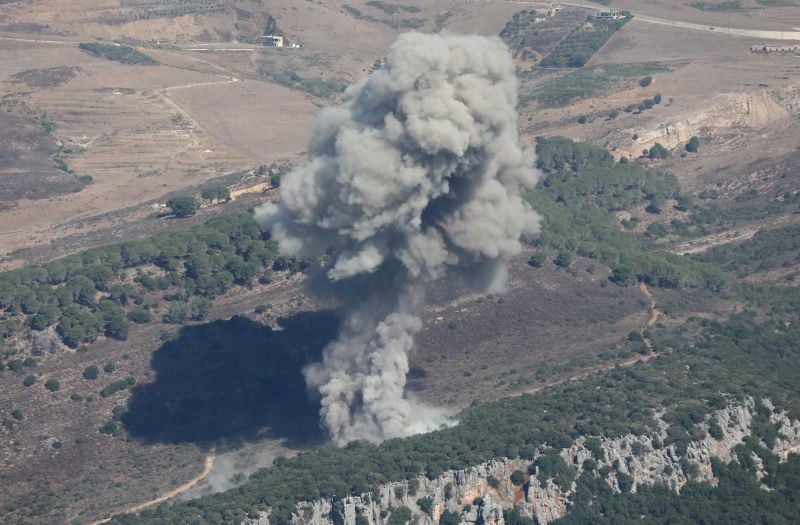
An Israeli airstrike on Beirut killed a senior Hezbollah commander on Tuesday as cross-border rocket attacks by both sides increased fears of a full-fledged war in the Middle East.
Lebanon reported 569 people had been killed and 1,835 wounded since Israel launched heavy strikes on Monday morning, including 50 children, Health Minister Firass Abiad told Al Jazeera Mubasher TV.
Israel's military said the airstrike on the Lebanese capital killed Ibrahim Qubaisi, who it said was the commander of Hezbollah's missile and rocket force. Two security sources in Lebanon described him as a leading figure in the Iran-backed group's rocket division.
Israel's military later said the airforce also conducted "extensive strikes" on Hezbollah targets across southern Lebanon, including weapons storage facilities and dozens of launchers that were aimed at Israeli territory.
Hezbollah said it launched rockets on Tuesday at the Dado military base in northern Israel and attacked the Atlit naval base south of Haifa with drones, among other targets.
The Israeli military said sirens sounded in the early evening in the northern city of Safed, where Dado is located, and nearby areas. It did not say whether the base was hit.
Israel's new offensive against Hezbollah has stoked fears that nearly a year of conflict between Israel and the militant Palestinian group Hamas in Gaza could destabilise the Middle East.
Israel is shifting its focus from Gaza to the northern frontier, where Hezbollah has been firing rockets into Israel in support of Hamas, which is also backed by Iran.
Israel wants to secure its northern border and allow displaced residents to return. This has set the stage for a long conflict, while Hezbollah has said it will not back down until a ceasefire is reached in Gaza.
Growing calls for diplomacy
Calls for diplomacy are growing as the conflict worsens, with UN human rights chief Volker Turk urging all states and actors with influence to avert further escalation in Lebanon.
"I believe that we can still find a path forward to get de-escalation between Israel and across that northern border between Israel and Lebanon and bring about a diplomatic solution that allows people to return to their home," White House national security adviser Jake Sullivan told MSNBC.
The strikes have piled pressure on Hezbollah, which last week suffered heavy losses when thousands of pagers and walkie-talkies used by its members exploded in the worst security breach in its history.
The operation was widely attributed to Israel, which has a long history of sophisticated attacks on foreign soil. It has not confirmed or denied responsibility.
Hezbollah's media office said on Tuesday that Israel was dropping leaflets with a "very dangerous" barcode on them onto Lebanon's eastern Bekaa Valley, warning that scanning it by phone would "withdraw all information" from any device. There was no immediate comment from the Israeli military.
Hezbollah's media office did not say if anything else was written on the flyers. Israel's intelligence and technological prowess has given it a strong edge in both Lebanon and Gaza. It has tracked down and assassinated top Hezbollah commanders and Hamas leaders.
Meanwhile, Israel's military said about 55 projectiles had crossed into Israel in the latest attacks, but the majority were intercepted. Hezbollah said it had bombed the logistical warehouses of the 146th Division in the Naftali base with a rocket salvo.
'A VERY DIFFICULT WAR'
Israel struck the Hezbollah-controlled area of Beirut for a second consecutive day. The Lebanese health ministry said at least six people were killed and 15 wounded when a building in the Ghobeiry neighbourhood of Beirut was struck.
Lebanese environment minister Nasser Yassin said 27,000 people were registered as displaced by the bombing campaign launched by Israel on Monday.
"We felt as if we were in a war, a very difficult war," said Rima Ali Chahine, 50, speaking at a makeshift shelter for displaced people at a Beirut college.
"Maybe it didn't take us long on the road, but families are now arriving who have been stuck on the roads since yesterday - 15 or 16 hours on the roads."
The casualties and the intensity of the attacks by the most powerful and advanced military in the Middle East have spread panic in Lebanon, but also defiance among people who recall the devastating Israel-Hezbollah war in 2006.


1732085354-0/insta-(1)1732085354-0-165x106.webp)

1725366721-0/kyle-(1)1725366721-0-165x106.webp)
1732085354-0/insta-(1)1732085354-0-270x192.webp)







1727167884-0/BeFunk_§_-(43)1727167884-0.jpg)







COMMENTS
Comments are moderated and generally will be posted if they are on-topic and not abusive.
For more information, please see our Comments FAQ